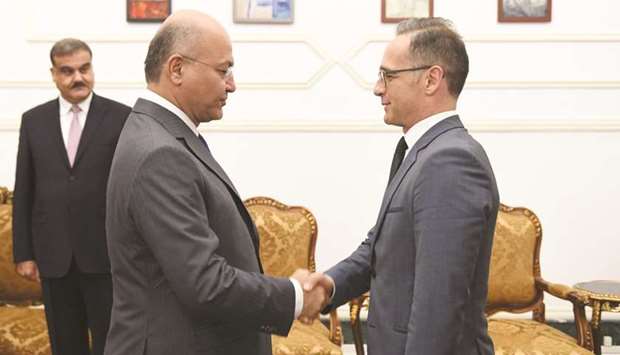German Foreign Minister Heiko Maas yesterday warned countries not to abandon Iraq, which risks being pulled deeper into an ongoing conflict between Iran and the United States.
Maas said the Iraqi government had serious concerns about being dragged into regional tensions.
He praised Baghdad’s “measured” approach and mediating role after holding talks with Prime Minister Adel Abdel Mahdi and President Barham Salih. “We cannot abandon Iraq now,” he said, pledging to continue supporting Iraq’s rebuilding effort.
Maas also said Germany would continue to participate in an international mission to combat Islamic State.
He warned that the terrorist group could rebuild structures “underground,” a reality that “we can and must prevent.”
The Baghdad portion of Maas’ trip was previously unannounced for security reasons. Today, Maas is due to continue to the United Arab Emirates and Jordan, before heading to Iran, where he will lobby for the preservation of the 2015 nuclear deal.
There are fears the spat could spill over into Iraq, where there are numerous militias backed by Iran.
The country is also home to thousands of US soldiers who are training Iraqi forces and supporting the fight against Islamic State.
Maas had earlier appealed for a de-escalation of regional tensions, urging all sides not to “add fuel to the fire” and calling on Europe to step up its mediation role. “There is a clear danger of miscalculations, misunderstandings, provocations leading to unforeseeable consequences in this highly tense region,” Maas warned on arrival in Baghdad.
Maas said tensions between Iran and the United States had “reached a fever pitch” and it was up to European powers to take a lead in negotiations to help resolve the situation.
“The latest escalation requires us as European neighbours to intervene in favour of de-escalation and peaceful co-existence,” Maas said. “We cannot just seek dialogue, we must lead it, precisely where the differences seem insurmountable and long-simmering conflicts run deep.”
The US unilaterally withdrew last year from the Iran agreement, which was aimed at preventing Tehran from acquiring a nuclear arsenal, and has since begun implementing oil and banking sanctions that have crippled Iran’s economy.

Iraq’s President Barham Salih meets with German Foreign Minister Heiko Maas, in Baghdad, yesterday.
